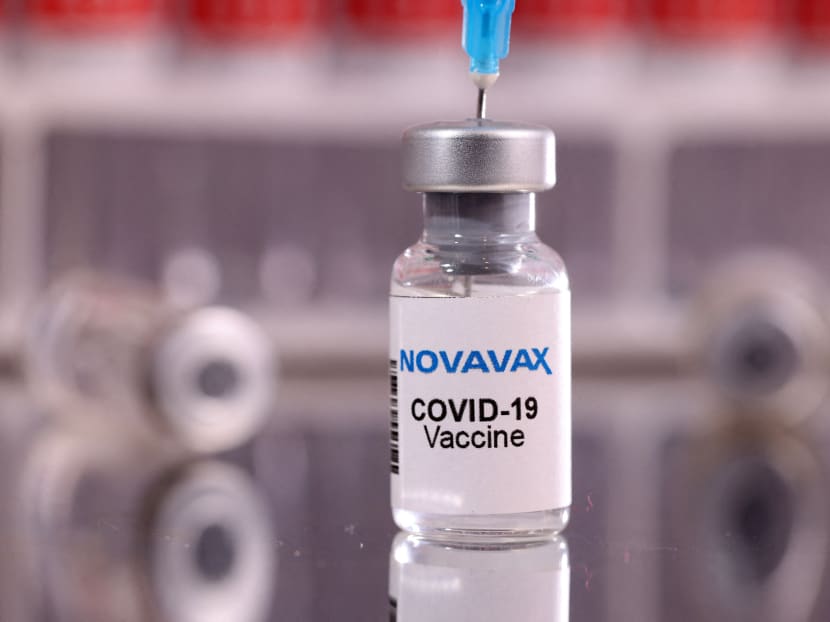Novavax's non-mRNA Covid-19 vaccine approved for use in S'pore; first batch expected in coming months: HSA
SINGAPORE — The Nuvaxovid Covid-19 vaccine by American firm Novavax has received the go-ahead from the Singapore authorities for use here in persons aged 18 and above. The first batch of the vaccines is expected to arrive in the next few months, barring any disruption to the shipment schedule.

The Nuvaxovid vaccine by American company Novavax uses a long-established protein-based technology.
- The Health Sciences Authority has granted interim authorisation to Novavax’s Covid-19 vaccine Nuvaxovid under a special access route
- It is for primary and booster vaccination in persons aged 18 and above
- The first batch of the vaccines is expected to arrive in the next few months
- Singapore's expert committee on vaccination said Nuvaxovid is preferred to the Sinovac jab for persons medically ineligible to receive mRNA vaccines
- This is in light of the lower efficacy of the Sinovac jab
SINGAPORE — The Nuvaxovid Covid-19 vaccine by American firm Novavax has received the go-ahead from the Singapore authorities for use here in persons aged 18 and above. The first batch of the vaccines is expected to arrive in the next few months, barring any disruption to the shipment schedule.
Nuvaxovid uses a long-established protein-based technology that is an alternative to the messenger ribonucleic acid (mRNA) vaccines by Pfizer-BioNTech and Moderna. The vaccination regimen will comprise two 5mcg doses to be administered three weeks apart.
The national Covid-19 task force said in a statement on Monday (Feb 14) that it had accepted the recommendation of the expert committee on Covid-19 vaccination for Nuvaxovid’s inclusion in the national vaccination programme. It will be available for both primary and booster vaccination.
The Health Sciences Authority (HSA) already granted interim authorisation of the vaccine under the Pandemic Special Access Route, which paves the way for early access to critical new vaccines, medicines and medical devices during a pandemic.
HSA said in a statement on Monday that this was done on Feb 3 after its review of the vaccine showed that it met quality, safety and efficacy standards.
The agency's clinical review was based on two third-phase clinical studies done in Mexico, the United Kingdom and the United States, comprising more than 40,000 participants aged between 18 and 95.
Clinical results showed that Nuvaxovid demonstrated an efficacy of about 90 per cent against symptomatic Covid-19 and 100 per cent in preventing severe Covid-19.
Nuvaxovid showed consistent effectiveness against the Alpha variant of the coronavirus, but there was no data on the Delta and Omicron strains, because these variants were not prevalent at the time Novavax carried out the clinical trials.
“Based on the data accrued from the clinical trials to date, the safety profile of Nuvaxovid was generally consistent with other registered vaccines in Singapore,” HSA said.
Two groups of experts from HSA’s medicines advisory committee and panel of infectious diseases experts were also consulted. They agreed with HSA’s interim authorisation for Nuvaxovid, the authority added.
The protein technology underpinning Nuvaxovid has been in use since the mid-1980s. Today, it is a standard tool in the fight against viruses such as the one that causes hepatitis B and the human papillomavirus that can lead to cancer.
SIDE EFFECTS AND EFFICACY
Similar to the Covid-19 vaccines in use now, recipients of Nuvaxovid may experience side effects that include pain and tenderness at the injection site, fatigue, headache and muscle pain.
As with all vaccines, the risk of severe allergic reactions remains for a small proportion of susceptible persons, including those with a history of anaphylaxis — the rapid onset of serious allergic reactions.
The expert committee on Covid-19 vaccination said on Monday that most side effects were mild to moderate in severity, and resolved in one to three days.
It said that it had reviewed Nuvaxovid's safety and efficacy data independently, and there have been no significant safety concerns identified.
Although it recommended Nuvaxovid as an acceptable alternative to the mRNA vaccines for those aged 18 and older, it said that mRNA vaccines are still preferred for their higher efficacy and the stronger immune response they generate.
“In view of the lower efficacy of the Sinovac-CoronaVac vaccine, Nuvaxovid is preferred to Sinovac-Coronavac for persons medically ineligible to receive the mRNA vaccines. The Sinovac-CoronaVac vaccine should only be used by persons who are medically ineligible for the mRNA vaccines and Nuvaxovid,” the committee added.
It also recommended Nuvaxovid as an acceptable alternative to the mRNA vaccines for booster jabs in persons aged 18 and older, with one dose about five months after the last dose of their primary vaccine jabs.
It noted that a second-phase trial in the UK with more than 2,800 participants, which studied various vaccines for booster vaccination, showed that Nuvaxovid resulted in a substantial rise in antibody levels and cellular response. This was, however, to a lower extent when compared with mRNA vaccines as booster jabs.
Nuvaxovid will join Pfizer-BioNTech/Comirnaty, Moderna and Sinovac-CoronaVac as among the authorised vaccines under the Pandemic Special Access Route.











